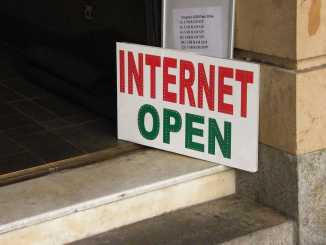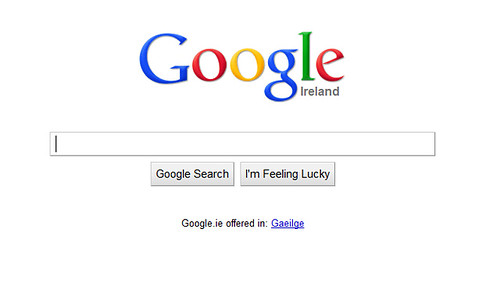
Introduction
This essay provides a critical analysis of Google and its transformative effect on society. Google has embedded itself into the lives of people around the world, to the extent that the word ‘Google’ has become a verb, meaning to search for something (Fuchs, 2011, p.31). Through its personalised algorithm, it provides the opportunity for advertisers to target consumers at incredibly high success rates. Further, Google acts within the larger internet ecosystem, and almost all aspects are interdependent and linked. This essay will show the effect of Google in society and how it works within an ecosystem.
What it is
Fundamentally, Google is an online advertising and search company (Kreiss and McGregor, 2018, p.161). Google also provides services through an extensive profile of businesses, for example, YouTube and G-mail (Kreiss and McGregor, 2018, p.161).
Their main offered feature: The search engine
How it works:
Sullivan describes the type of search engine used by Google as the ‘Crawler-based search engine’ (2002, p.1).
-
- The Spider or Crawler: Obtains the relevant sites and provides them to the index
- Index: Stores the sites found by the spider (a database)
- Search Engine Software: Searches through all obtained sites, and ranks them in order of relevance
Figure 1: Simple explanation of how Google works. Video by Google. YouTube. CC BY.
Historical development of Google
The crucial factor driving innovation towards search engine algorithms and technology, like Google, was the need to sort through increasingly complex databases in an efficient manner (Hutson, Taft, Barocas & Levy, 2018, p.7).
This need originated at libraries, which essentially acted as a physical search engine. Libraries’ use of computers established the principal functions used in search engines today (Halavais, 2013, p.11).
When Google was founded in 1998 (Google, 2020), their search engine’s algorithm used ‘PageRank’ to retrieve and present information to the consumer in a mostly unbiased and democratic way (Carson, 2015, p.3). In 2009 however, Google’s business model and algorithm underwent large alterations. ‘PageRank’ was replaced with a personalised algorithm, which provided websites relevant to their interests and desires (Carson, 2015, p.4).
Google has transformed into one of the largest media conglomerates in the world and affects society in ways most do not even understand. The next section will analyse its business model and the consequential impacts of it.
Business Model
Google’s main form of revenue comes from advertising, just over 70% in 2019 (Clement, 2020). This is the driving factor shaping the business model to finding increasingly innovative and efficient ways of acquiring user data. Jarret expresses how in the context of search, our data becomes “the economic surplus” enabling continued growth for Google, to ultimately find more sophisticated ways to further “capture our data” (Jarret, 2014, p.19).
Whilst the main pull for consumers to Google is its search feature, its revenue is dependent on this “economic model”, where the users are viewed as products to be purchased by advertisers “(Hills, Petit, and Jarret, 2012, p.38).
As capitalists, profit will always be a core motivator for any business, which was an influential factor in replacing PageRank with personalisation. It could be argued that Google’s initial attempt to, as described by Google’s founder, work within the “democratic structure of the web” (Carson, 2015, p.3) and provide information in an objective way, has been compromised by a desire to generate maximum revenue.
Google’s search algorithm has always been its factor for success (Caufield, 2005, p.556). Similarly, monetising through advertisements has been inherent to Google’s business model from its inception (Caufield, 2005, p.556).
Its advertising model changed when ‘PageRank’ was replaced, from what is described as a CPM model (advertisers paid every 1000 impressions), to a ‘cost-per-click’ (CPC) model (Hills, Petit and Jarret, 2012, p.40). The CPC model means advertisers are only charged when clicked on by users. Robertson conveys how Google then became the most compelling platform for advertisers (2018, p.955).
Transformative effects
Business models online have been significantly affected and shaped by Google’s innovations.
Google was one of the first companies to create a platform, which exploited what is described as a ‘database of intention’ (DOI), and used this as a commodity (Battelle, 2005, p.5). Battelle defines DOI as “desires, wants and preferences” (2005, p.7).
Moreover, there has been a change for online business models to an explicit focus on results that can be measured in an objective manner, which Packer explains was “pioneered and widely implemented by Google” (Andrejevic and Burdon, 2015, p.28). The new online business model is centered around patterns, rather than people (Andrejevic and Burdon, 2015, p.28). For example, rather than focusing on an individual, understanding people’s search or buying patterns and how best to advertise to that.
They have been the drivers of the change from using money as payment to the use of data as payment. This advertising model they made successful exemplified how to profit from ‘free’ services, through data collection, that is sold to advertisers (Jarret, 2014, p.18).
Further, Google used all of their services as opportunities for enhanced advertising. For example, through search advertising and advertising through connected google email accounts (Jarret, 2014, p.23).
Google has provided a platform where businesses can find exposure and operate in previously unheard-of ways. Evidenced through ‘SeniorMedia’, a funeral company, thanks to ‘Google Analytics’, they were able to view the patterns of traffic on their website, and subsequently identify further opportunities for growth, by creating additional websites.
Similarly, advertisers have generated completely new techniques to find the most effective way of reaching their consumer: “Search Engine Optimisation” (SEO) is defined as the “on-page and off-page design strategies you can use to improve your search engine ranking” (Ledford, 2015, p.XVI). Thus, there has been a major shift in marketing strategies from ‘pre-Google’ times.
Societal
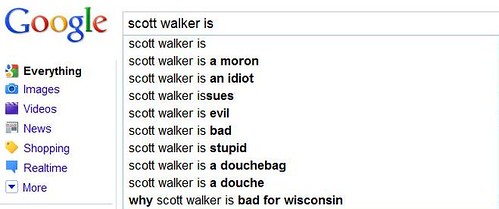
Google is perceived as almost synonymous with the internet being involved with most internet interactions. Its ubiquitous nature is cause for alarm due to its extreme influence it can have. As identified by Fuchs, it completely shapes “how we search, organise, and perceive information in contexts like the workplace, private life, culture, politics” (2011, p.31). This is evidenced in the autocomplete feature, which attempts to predict what a person is going to search for. Baker and Potts use the example of someone searching for “why do black holes exist” however “why do black people have big lips” appears as a recommendation (2013, p.201). This clearly has the power to corrupt views and construct beliefs.
Kreiss and McGregor explain that Google is in a position to dictate how individuals and groups communicate “with and through” their platform (2018, p.158). Changes in perceptions have the domino effect of changing the way one acts and relates to others.
Importantly, minority groups are being poorly represented. This is evident where common searches are recommended as autocomplete. The majority controls the recommendations, having a consequence of search engines discriminating against minority groups (Noble, 2013, p.50).
Political
The above analysis informs on its political implications. As illustrated by Kreiss and McGregor, Google (and Facebook) dictate where the attention of the public goes, through the algorithms affecting the visibility of content (2018, p.158).
Moreover, filter bubbles are created through the personalisation of algorithms. This is where users are only given websites supporting their current views. Carson argues filter bubbles deny individuals the most important information, which is the challenging of existing understandings (2015, p.8). Seeing as Google is used as a primary news source (Robertson, Lazer and Wilson, 2018, p.955), this significantly affects how people relate politically.
Economic
Economically, Google has two main benefiters:
- Itself (Google)
- Advertisers and its businesses
In the search ad market, Google has a 90% market share (Holden, 2020), generating in excess of $20billion annually (Noble, 2013, p.35).
Understanding this invokes the question of how ethical it is for a company to influence and control so many lives when its main motivator is profit. In 2005, Caufield predicted that search engines, like Googles, will inevitably resort to self-serving actions over commitment to the wellbeing of the users. Further, he identifies how search engines do not share or reflect the same values as librarians upheld, compromised by capitalistic endeavors (p.568).
Google and the Internet Ecosystem
As expressed by Gomez, Zabala, and Barrutia, online ecosystems are “communities of customers, suppliers, lead producers…” (2016, p.60).
The founders of Google were Larry Page and Sergey Brin, however, since 1998, it has undergone leadership and ownership changes. In 2015, Google renamed itself as ‘Alphabet’ and made Google it’s subsidiary (Sharma, 2019). Not long after, Brin and Page resigned, and Sundar Pichai became the CEO.
Over the years, to further improve market positions and continue its growth, Google has acquired more than 170 companies (Vugt and Jacobsen, 2017, p.7). Vugt and Jacobson identify the most notable of which as “Gmail, Android, Nexus and Chrome” (2017, p.7).
Viewing Google holistically, within its ecosystem, as communicated by Gomez, Zabala, and Barrutia, it operates within small worlds that are led by few actors (2016, p.54). These few actors are Google, Amazon, Facebook, and Apple, known as ‘GAFA’. These are Google’s largest competitors due to the extremely broad scope of markets each of them operates in.
In the western markets, there are only two main competitors in the search engine industry. That being Yahoo and Bing (Wuganag and Edison, 2011, p.131). However, Google has 85% (Wuganag and Edison, 2011, p.131) of market share in the western markets, and thus these are not Google’s main competitors. In the Asian market, however, Google has struggled to succeed, with for example ‘Baidu’ dominating the Chinese market and similarly ‘Naver’ in the Korean market (Wuganag and Edison, 2011, p.123).
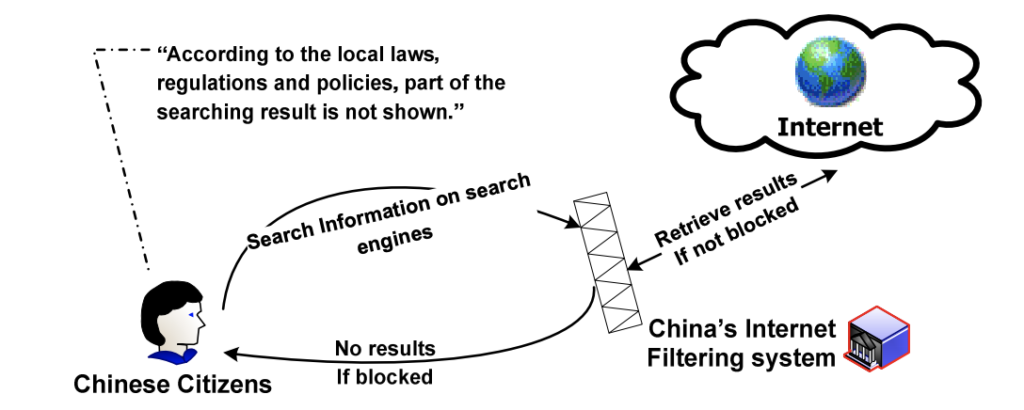
The figure below elucidates GAFA’s defined competition.
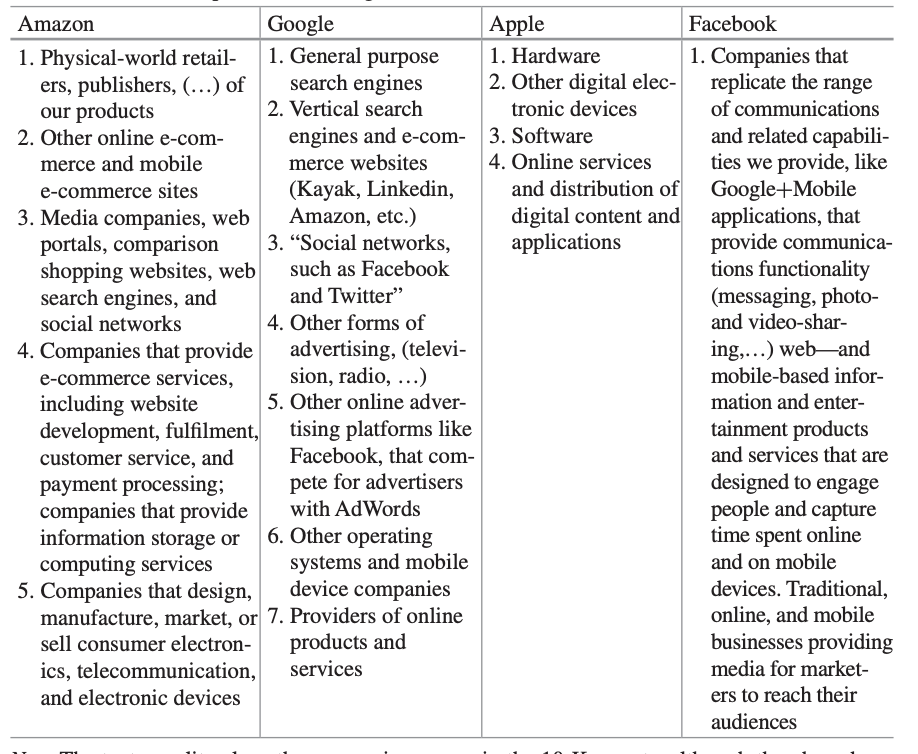
Specifically, in Google’s list, the second point associates Amazon as a competitor, similarly the third and fifth point conveys how Facebook is a competitor and lastly the sixth point makes Apple a competitor.
Martin and Dwyer describe the ecosystem through the “interconnected” transactions between “social platforms, news publishers, their users, and a range of metadata service providers” (2019, p.113).
Google acts as an “integrator company” creating business opportunities for smaller companies that ultimately work together to facilitate our online experience (Martin and Dwyer, 2019, p.107). Throughout the broad services it provides, Google has many partners and service providers, for example, SADA (Deutscher, 2020), and all of these smaller companies working in one way or another for Google, connect and create not only the experience of Google but combine to create the experience for the entire internet and all of its platforms.
Google’s main function to society is providing information, which can be seen as a threat to governments. This is why governing bodies are in charge of regulating and restricting Google’s function from country to country. For example, China, a country known for censorship and regulation, blocks Chinese citizens from any information on Google perceived as “undesirable” to their government (Wang, 2008, p.17).
Google’s Ecosystem
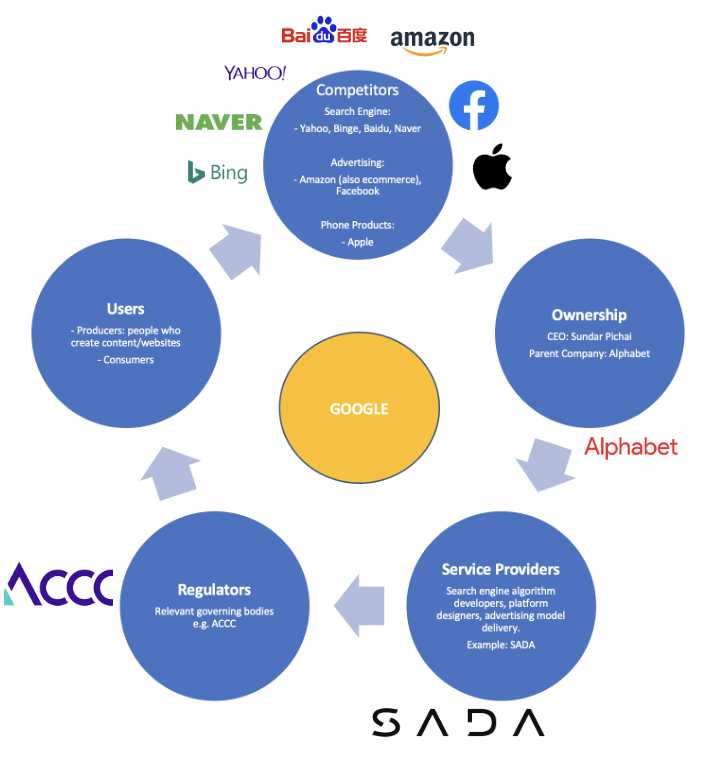
To conclude, Google has significantly disrupted business models as well as political and social relations.
They pioneered the change to data collection as forms of payment and managed to completely integrate itself into everyday life, with billions of people searching through google daily. Through the hundreds of companies they own, and the countless of companies they employ to ensure all the intricacies of its operations are delivered at a high standard, Google and all the other entities involved in the internet ecosystem are inherently linked and interdependent.
Reference List
ACCC. 2020. About the ACCC. Retrieved from:
Andrejevic, M., and Burdon, M. (2015). Defining the Sensor Society. Sage Journals. Retrieved from: https://journals-sagepub-com.ezproxy2.library.usyd.edu.au/doi/full/10.1177/1527476414541552
Baker, P., & Potts, B. (2012). ‘Why do white people have thin lips?’ Google and the perception of stereotypes via auto-complete search forms. (P.195-205).
Betalle, J., (2006). The search: How Google and its rivals rewrote the rules of business and transformed our culture.
Brown, K. (2014). Global Multistakeholder Meeting on The Future of Internet Governance. Internet Society. Retrieved from: https://www.internetsociety.org/wp-content/uploads/2017/09/ISOC-Internet-Ecosystem.pdf
Carson, A., (2015). Public Discourse In The Age Of Personalization: Psychological Explanations And Political Implications Of Search Engine Bias And The Filter Bubble. [online] Sciencepolicyjournal.org. Retrieved from: https://www.sciencepolicyjournal.org/uploads/5/4/3/4/5434385/pa3finalformattedv2.pdf
Caufield, J. (2005). Where did Google get its value?. Project Muse. Pp. 555-572. Retrieved from: https://muse.jhu.edu/article/188622/pdf
Clement, J. (2020). Advertising revenue of Google from 2001-2019. Statistica. Retrieved from:
Deutscher, M. (2020). Google’s cloud business unveils $500M services collaboration with partner SADA. Retrieved from:
Fuchs, C. (2011). A Contribution to the Critique of the Political Economy of Google. p. 31-50.
Gomez, M., Zabala, J., and Barrutia, J. (2015). Dynamics of big internet industry groups and future trends. Springer. Retrieved from: https://link.springer.com/chapter/10.1007/978-3-319-31147-0_4
Google Policies. (2020). Who are Google’s Partners? Retrieved from: https://policies.google.com/privacy/google-partners?hl=en
Google. (2019). Submission in Response to the ACCC’s Preliminary Report. Retrieved from:
https://www.accc.gov.au/system/files/Google%20%28February%202019%29.PDF
Google. (2020). From the Garage to the Googleplex. Retrieved from:
https://about.google/our-story/
Hills, K., Petit, M., and Jarret, K. (2012). Google and the Culture of Search. Retrieved from: https://books.google.com.au/books?hl=en&lr=&id=R7Lzp7apkJgC&oi=fnd&pg=PP2&dq=what+lead+to+googles+dominance+in+search+industry&ots=JlDxa89Vsz&sig=Hmo1xHAGNd1cw5Eb4GuhaQj8-kY#v=onepage&q=business%20model&f=false
Halavais, A. (2013). The engines. In Search engine society (pp. 5–31). Cambridge, UK ; Malden, MA: Polity.
Holden, R. (2020). Vital Signs: Google’s huge market share doesn’t automatically make it a monopoly. The Conversation. Retrieved from: https://theconversation.com/vital-signs-googles-huge-market-share-doesnt-automatically-make-it-a-monopoly-148525
Jarrett, K. (2014). A database of intention. In Society of the query reader: Reflections on web search (pp. 16–29). Amsterdam: Institute of networked cultures.
Kreiss, D., and McGregor, S., (2018). Technology Firms Shape Political Communication: The Work of Microsoft, Facebook, Twitter, and Google With Campaigns During the 2016 U.S. Presidential Cycle. Taylor and Francis Online. Retrieved from: https://www.tandfonline.com/doi/full/10.1080/10584609.2017.1364814?casa_token=ATsm973cc7QAAAAA%3AHUpglQscs1EjT6OJhoM0GDuXa9UoNKkSiPBQC_8GXFALeSg8olIWdax2m_G-N7xpucznoF25mteETg
Lamb, V. (2011). Scott Walker Autocomplete. Flikr. Retrieved from: https://www.flickr.com/photos/22320444@N08/5467332729
Lazer, D., Robertson, R., and Wilson, C., (2018). Auditing the Personalisation and Composition of Politically-Related Search Engine Results Pages. Web and Society. Retrieved from: https://dl.acm.org/doi/pdf/10.1145/3178876.3186143?casa_token=-ko2qKPiSt8AAAAA:W9aM7PGizThF9NUMfb8077kZcZ88yXIBurtZ3ZD4qxYgRUwR00IXnU6i6d1m6t0aHIMHRrf0UzDIMQ
Ledford, J. (2015). Search Engine Optimization Bible. Google Books. Retrieved from: https://books.google.com.au/books?hl=en&lr=&id=2Gz-CAAAQBAJ&oi=fnd&pg=PR16&dq=search+engine+optimization&ots=vIFIUsaY5B&sig=93GZiQEa3zDATR8VgpQWYVw-a_M&redir_esc=y#v=onepage&q=search%20engine%20optimization&f=false
Martin, F. (2019). The Business of News Sharing. In F. Martin & D. Tim (Eds.), Sharing News Online: Commendary Cultures and Social Media News Ecologies (pp. 91–127). Cham, Switzerland: Palgrave Macmillan
Muzellec,L., Ronteau, S., and Lambkin, M. (2015). Two-sided Internet platforms: A business model lifecycle perspective. ScienceDirect. Retrieved from: https://reader.elsevier.com/reader/sd/pii/S0019850115000474?token=2AA4176B9A9BB994FF5F765223EB3EB4FA3AB2DE4B6525313B098118568DCEA585242F50145E68699DD7957E6B7DC684
Noble, S. U. (2018). A society, searching. In Algorithms of Oppression: How search engines reinforce racism (pp. 15–63). New York University
Sharma, R. (2019). Why Google became Alphabet. Investopedia. Retrieved from: https://www.investopedia.com/articles/investing/081115/why-google-became-alphabet.asp#:~:text=Google%20is%20a%20household%20name,to%20become%20a%20technology%20conglomerate
Sullivan, D., (2002). How Search Engines Work. [online] Didattica-2000.archived.uniroma2.it. Retrieved from: https://didattica-2000.archived.uniroma2.it//prog_web/deposito/search_engine.pdf
Vugt, M., and Jacobsen, O. (2017). Applying the value grid model; an examination of Google. Retrieved from: https://www.diva-portal.org/smash/get/diva2:1080917/FULLTEXT01.pdf
Wang, N. (2008). Control of Internet search engines in China – A study on Google and Baidu. Unitec. Retrieved from: https://unitec.researchbank.ac.nz/bitstream/handle/10652/1272/fulltext.pdf?sequence=1&isAllowed=y
Wugang, Z., and Edison, T. (2011). Competition in Search Engine Market. ProQuest. P.123-150. Retrieved from: https://search.proquest.com/docview/1241201969/fulltext/41ADD1672A1E4C3EPQ/1?accountid=14537

